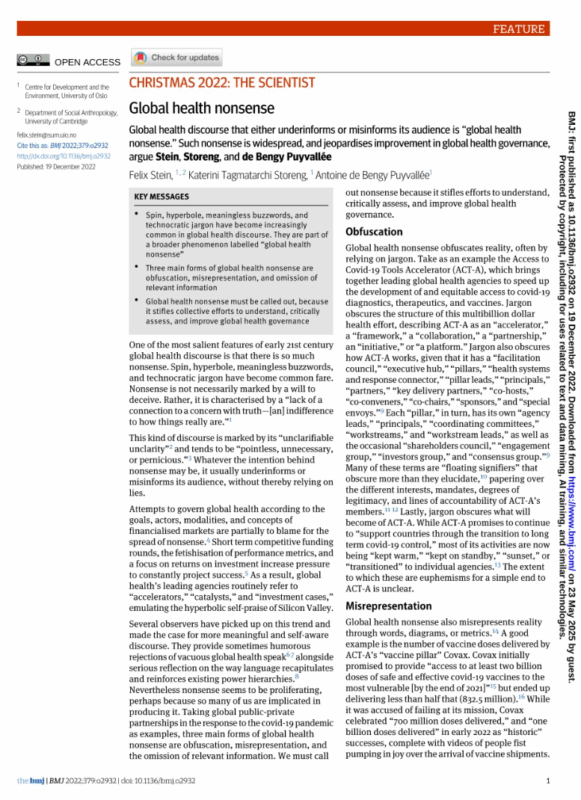
Luchuo Engelbert Bain/luchuoengelbertbain.com
May 27, 2025, 10:52
Luchuo Engelbert Bain: 9 Ways the Buzzword Epidemic Undermines Global Health Scholarship and Evidence Translation
Luchuo Engelbert Bain, Head of International Programs at African Population and Health Research Center, shared a post on LinkedIn:
“The Impact of Buzzwords on Global Public Health Practice and Scholarship.
The unchecked proliferation of buzzwords in global health—terms like “diversity,” “accelerators,” “decolonization” “localization” “gender sensitive, transformative” “intersectionality” —risks undermining intellectual rigor, policy clarity, and evidence-based action. Buzzwords often serve marketing over meaning, masking power imbalances, perpetuating technocratic jargon, and diluting critical scholarship. Their use fosters strategic ignorance and narrows research scope.
9 Ways the Buzzword Epidemic Undermines Global Health Scholarship and Evidence Translation:
Dilution of Meaning: Buzzwords lose conceptual clarity as they are overused, repurposed, and loosely defined—making it harder to distinguish between distinct approaches or interventions.
Obfuscation of Accountability: Terms like “platform,” “cocreation” “decolonization” “ localization” “equitable partnerships” “collaboration,” or “accelerator” mask the complexity, hierarchy, and inequities in governance structures, making scrutiny difficult.
Misrepresentation of Outcomes: Buzzwords often accompany inflated or vague metrics (e.g., “lives saved” or “catalytic funding”), distorting actual impact and misleading stakeholders.
Suppression of Critical Debate: Vague language shields initiatives from critique by depoliticizing or moralizing terms like “diversity” or “empowerment”.
Fetishization of Performance: Buzzword-heavy discourse feeds into donor-centric success narratives, prioritizing optics and rapid outputs over deep structural change.
Limitation of Research Scope: The need to align with fundable “hot topics” forces researchers to oversimplify complex issues and conform to narrow programmatic goals.
Perpetuation of Power Asymmetries: Buzzwords help entrench Northern-driven policy paradigms by masking critical socio-political contexts and displacing local agency.
Fragmentation of Interventions: Projectified funding tied to buzzword trends leads to short-termism, undermining sustainable, systemic responses.
Marginalization of Structural Determinants: Euphemistic language like “disadvantaged” or “special populations” diverts attention from root causes.
Buzzwordization and checkbox syndrome are killing critical public health research, widening the gulf between who sets the agenda, what communities need, and what gets implemented. By masking power asymmetries and prioritizing optics over substance, these trends stifle meaningful knowledge translation and distort accountability, threatening the very equity global health claims to champion.
Buzzwords are a huge contributor to global health “nonsense”. I enjoyed reading the paper by Felix Stein and colleagues (2022).”
Luchuo Engelbert Bain shared a critique on how buzzwords compromise integrity in global health by obscuring meaning, accountability, and impact. He outlined nine key issues and called for more rigorous, transparent, and context-aware public health discourse.

More posts featuring Luchuo Engelbert Bain.
-
Challenging the Status Quo in Colorectal Cancer 2024
December 6-8, 2024
-
ESMO 2024 Congress
September 13-17, 2024
-
ASCO Annual Meeting
May 30 - June 4, 2024
-
Yvonne Award 2024
May 31, 2024
-
OncoThon 2024, Online
Feb. 15, 2024
-
Global Summit on War & Cancer 2023, Online
Dec. 14-16, 2023
Aug 21, 2025, 10:23
Aug 21, 2025, 10:08
Aug 21, 2025, 09:30
Aug 21, 2025, 08:17
Aug 21, 2025, 06:29
Aug 21, 2025, 00:00
Aug 20, 2025, 23:11
